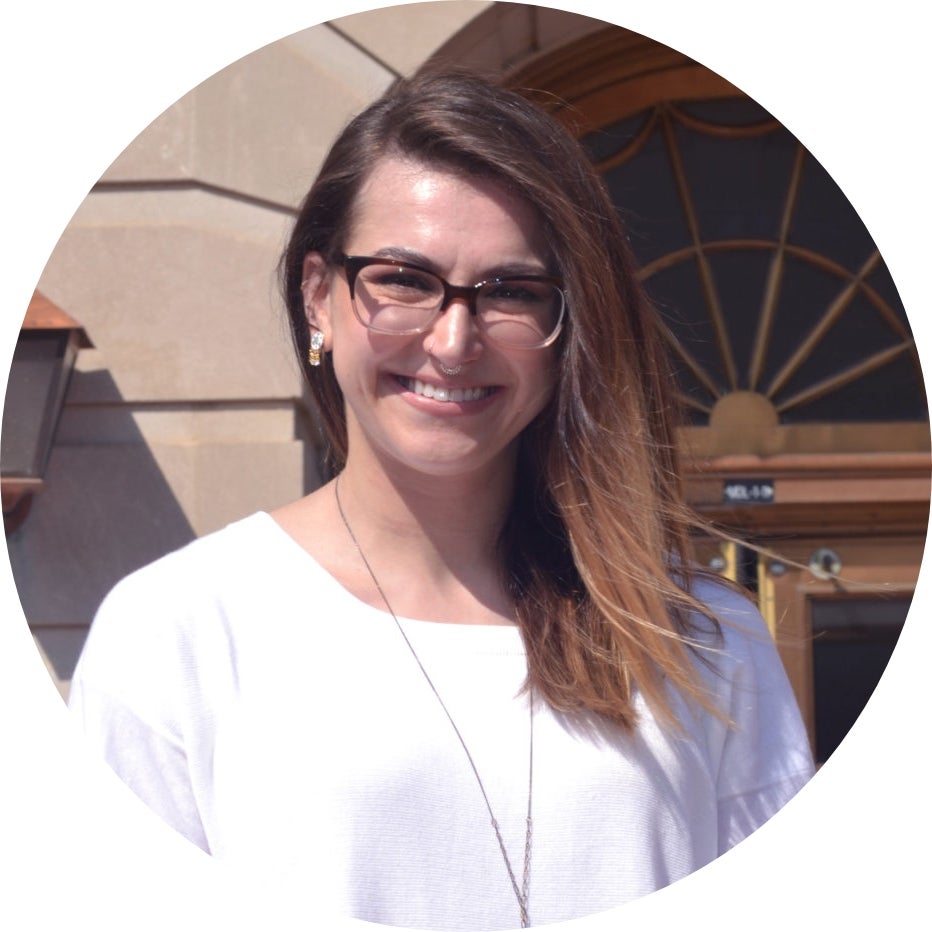
2018 Mistletoe Research Fellowship Recipient
“To see compounds I had helped develop enter clinical trials and actually be used in patients was so incredibly rewarding. The work that scientists do has very real and often very immediate impacts. Once I saw that first-hand, I was hooked!”
About Alana
Alana Lelo is a 5th-year candidate in the PhD Tumor Biology program at Biomedical Graduate Education (BGE) and 7th in the overall MD-PhD program. Alana is originally from Brooklyn, New York, and proud to be a born and raised New Yorker! She graduated in 2009 with a degree in Chemistry from New York University and matriculated into the Georgetown MD-PhD program in June 2012. After completing her pre-clinical coursework in Georgetown School of Medicine, she joined the Department of Tumor Biology to conduct her thesis research.
What made you choose Georgetown University for your PhD?
I looked at a number of different universities for my graduate training but coming to Georgetown was an easy decision. Georgetown’s Lombardi Comprehensive Cancer Center, an NCI designated comprehensive cancer center, provides an incredible resource to explore many different subfields of cancer biology research. Georgetown’s prime location in the heart of the nation and proximity to NIH (It’s basically right across the road from here!) provides incredible opportunities for me. I have visited NIH multiple times for workshops and seminars, and NIH researchers often give seminars and talks at Georgetown. This provides a robust environment for collaboration, discussion, and idea generation. I have also gone to Capitol Hill to advocate for increased federal research funding while being able to get back in the lab in time for some afternoon experiments. If you want to be at a place where science really happens Georgetown is the place to be.
What is your research focus and how did you become interested in it?
I have always been interested in cancer research. My first research experience was during undergrad at a biopharmaceutical company called OSI Pharmaceuticals. I worked on developing drugs in the pre-clinical setting so that they could one day be tested in clinical trials and ultimately, be used to treat patients. To see compounds I had helped develop enter clinical trials and actually be used in patients was so incredibly rewarding. The work that scientists do has very real and often very immediate impacts. Once I saw that first-hand, I was hooked!
Currently, I am in Todd Waldman’s lab where I study a protein called STAG2 in the context of early-stage bladder cancer. Bladder cancer is the fourth most common cancer in American men and while most tumors present as early-stage lesions that can be surgically resected, the majority of these tumors will come back. Moreover, many of these tumors will come back a lot angrier.
Until my thesis work, there wasn’t a reliable way to predict which patients would experience recurrences and progression of their disease. Patients would receive a very aggressive treatment course, even if they would never have had a tumor come back. In an ideal world, we would be able to treat each patient individually and tailor treatment to their unique disease. I found that the presence or absence STAG2, a protein that my lab discovered as one of the most commonly mutated proteins in cancer, could accurately predict disease course in bladder cancer patients. I recently published my findings in the journal Clinical Cancer Research in a paper titled “STAG2 is a Biomarker for Prediction of Recurrence and Progression in Papillary Non–Muscle-Invasive Bladder Cancer.”
What is the name of the award you received, and can you briefly describe it?
I received the Mistletoe Research Fellowship. “The Mistletoe Foundation is the philanthropic partner of Mistletoe, Inc., the social venture community founded by Japanese serial entrepreneur, Taizo Son. Founded in 2017, the mission of the Mistletoe Foundation is to build bridges between the academic, entrepreneurial, and civil communities to create a more human-centered and sustainable future through technology.”
What do these awards mean to you?
I am extremely honored and humbled to have been selected for this prestigious fellowship. The unfettered research grant provides me with the funds to continue to develop my project on STAG2. After demonstrating the utility of STAG2 immunohistochemistry in the clinical setting with commercial antibodies, the logical next step is to develop a proprietary antibody against this protein. The research grant will allow me to embark on this aspect of my project.
I am especially excited about the start-up collaboration. This allows me to use the unique skill-set I have gained throughout my training at Georgetown and apply it to a real-world problem. I am incredibly excited to work on this novel medical device and contribute to Mistletoe’s mission for a more human-centered and sustainable world.
Do you have tips for other students interested in applying for this award or other external awards?
You don’t know what you can receive unless you apply! I would advise students to keep an eye out for departmental and other graduate emails for various award opportunities. Once you have written a few applications, the rest is easier since you have some text already written.
Think outside of the box too! I never would have thought I’d be involved in the start-up world, but here I am! Think beyond the lab – is there something that you are really passionate about? Personally, I am very interested in advocacy against science denialism and anti-intellectualism and have found some incredible opportunities that have allowed me to explore these interests. I am also interested in science policy and was successful in obtaining a training award that allowed me to explore this interest. Apply broadly and often!
If you could meet one scientist, who would you want to meet and why?
As a fellow Polish woman in the STEM, I have to say the double Nobel prize winner Marie Skłodowska Curie. 🙂
